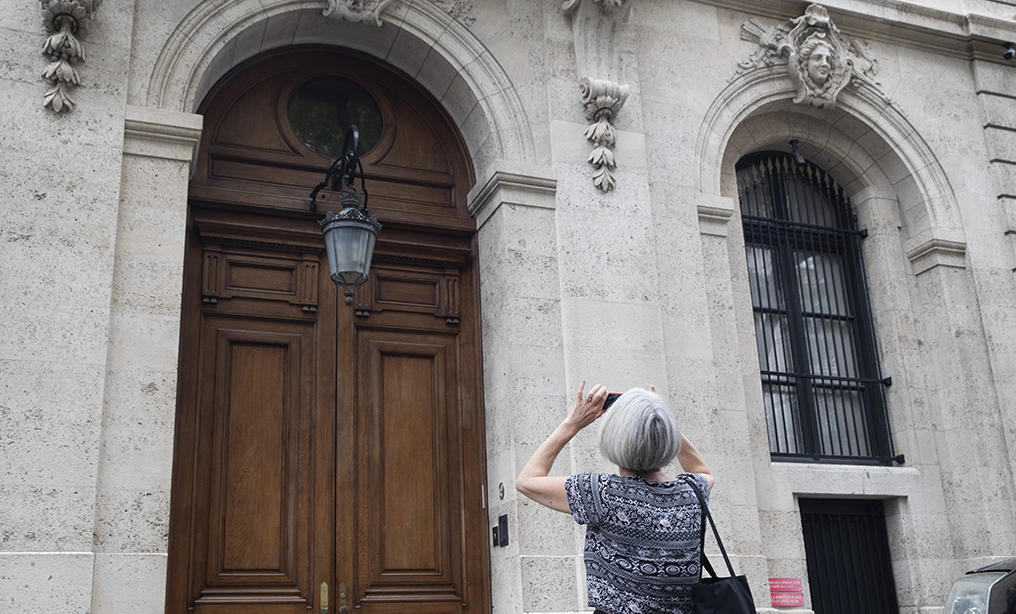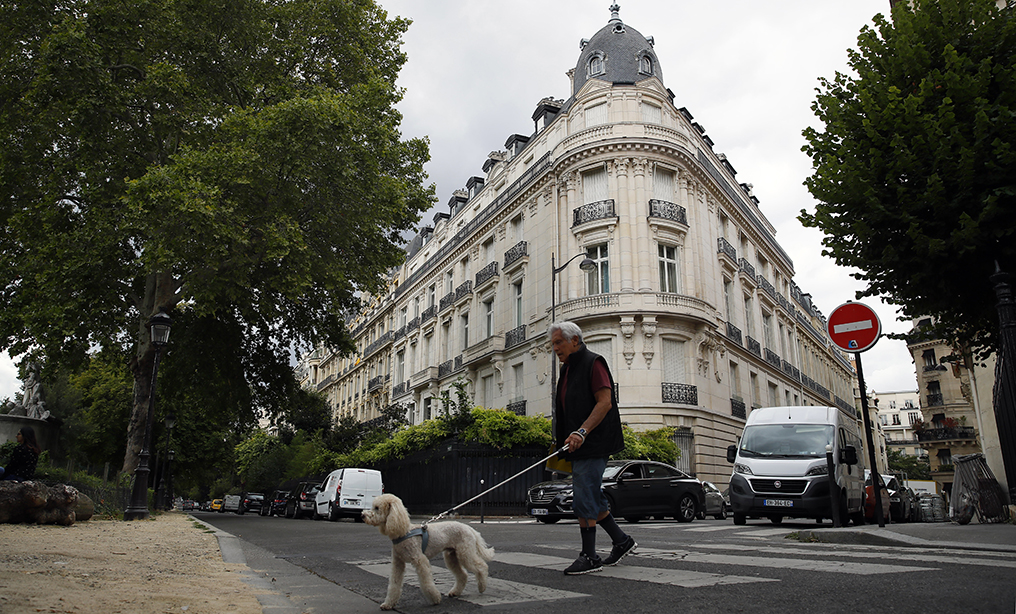Civil Litigation Is Complicated by Jeffrey Epstein's Death, Mysterious Estate
Epstein's death brought a sudden and unexpected close to the criminal case against him, and came as a blow to his accusers, who had hoped to confront their alleged abuser in court.
August 14, 2019 at 01:42 PM
5 minute read
 A pedestrian stop to take a photo of Jeffrey Epstein’s townhouse on the Upper East Side of Manhattan on Tuesday. Photo: Mary Altaffer/AP
A pedestrian stop to take a photo of Jeffrey Epstein’s townhouse on the Upper East Side of Manhattan on Tuesday. Photo: Mary Altaffer/AP
Jeffrey Epstein’s death last week in a Manhattan jail cell has complicated the path for victims of the wealthy financier seeking to recover from his estate, unleashing a slew of questions about where his assets are and who stands to inherit his millions.
In addition to criminal charges of sex trafficking and conspiracy, Epstein was also facing the prospect of numerous civil suits from his accusers, when he was found dead early Saturday at the Metropolitan Correctional Center, apparently by suicide.
Epstein’s death brought a sudden and unexpected close to the criminal case against him, and came as a blow to his accusers, who had hoped to confront their alleged abuser in court. Attorneys for the victims, however, have nonetheless vowed to move ahead with civil suits against Epstein’s estate, the exact details of which appear to be shrouded in mystery.
It was not immediately clear if Epstein, who had no spouse or known children, left a will appointing anyone to oversee his estate. What’s also unclear is the total value of his assets and whether they were held in offshore accounts or trusts.
“My guess is he’s not going to have had normal estate-planning devices and has probably been working to hide his assets,” said Steven Mintz, founding partner of Mintz & Gold in New York.
“It strikes me as a bad day for the plaintiffs lawyers and a bad day for plaintiffs,” he said.
Court filings from Epstein’s criminal case show that Epstein claimed $559 million in total assets, including a lavish townhouse on Manhattan’s Upper East Side, homes in Florida and New Mexico, and a private island in the Caribbean. He was also known, according to court documents, to own a private jet, as well as a fleet of automobiles, though those were not listed on Epstein’s financial disclosure.
 A man walks his dog next to an apartment building owned by Jeffrey Epstein in the 16th district in Paris on Tuesday. Photo: Francois Mori/AP
A man walks his dog next to an apartment building owned by Jeffrey Epstein in the 16th district in Paris on Tuesday. Photo: Francois Mori/APProsecutors said Epstein was worth more than $500 million and earned at least $10 million a year. However, it remains largely unknown exactly how he made all of his money and where he kept it. Those questions, attorneys said, would be key to probate proceedings to determine what to do with Epstein’s assets. A likely venue for that litigation would be the U.S. Virgin Islands, which prosecutors identified as Epstein’s primary residence before his arrest in early July.
While the probate proceedings play out, the government is expected to take the lead in marshaling Epstein’s assets, which could later be available to victims with claims against Epstein’s estate.
Had Epstein lived, the federal government could have started a restitution action to seize his assets for victims. Jennifer Freeman of the Marsh Law Firm said now that would have to be done through a civil forfeiture lawsuit, which presented its own complications, given that “things have shifted” since Epstein’s death.
“The question is can you bring an action still in New York state court,” she said. “The question is against whom.”
Prosecutors have said an investigation into Epstein’s associates and potential co-conspirators remains active, leaving open the possibility of further charges in the case. Should new defendants be named, they could be the target of restitution proceedings by the federal government, which could potentially expand the pool of recover for victims of Epstein and the illicit sex ring he was alleged to have run.
However, there still remains the task of ascertaining the scope of what prosecutors had called Epstein’s “vast wealth.”
Jayne Conroy, a named shareholder of Simmons Hanly Conroy, said there was a “whole system” built around Epstein, including employees who were familiar with his business operations and could be deposed.
“We have significant tools on the civil side,” she said. “We don’t have to wait for indictments.”
“Litigation, like no other process, sheds sunlight on ‘mysterious estates’ and gives victims vital necessary access tools. While his death may impact the civil litigation, he had many employees and colleagues and the courts in New York will be a gateway to their testimony and documents,” Conroy said.
Still, the ordeal could be set to play out over the course of years, as prosecutors and civil attorneys work to untangle the knot of Epstein’s finances and bring his co-conspirators to justice. Further complicating matters, a wave of lawsuits are expected to start to hit the dockets in New York state court this week, after the lawmakers opened a one-year revival window for child sex abuse victims to bring civil litigation, regardless of when it happened.
As of Wednesday morning, at least one such case had been against Epstein’s estate, though many more were expected in the coming days and weeks.
“There are a lot of moving parts,” Freeman said.
“This could be a Dickensian novel.”
This content has been archived. It is available through our partners, LexisNexis® and Bloomberg Law.
To view this content, please continue to their sites.
Not a Lexis Subscriber?
Subscribe Now
Not a Bloomberg Law Subscriber?
Subscribe Now
NOT FOR REPRINT
© 2025 ALM Global, LLC, All Rights Reserved. Request academic re-use from www.copyright.com. All other uses, submit a request to [email protected]. For more information visit Asset & Logo Licensing.
You Might Like
View All

Judge Denies Retrial Bid by Ex-U.S. Sen. Menendez Over Evidentiary Error

What Businesses Need to Know About Anticipated FTC Leadership Changes
7 minute readTrending Stories
- 1Chief Judge Joins Panel Exploring Causes for Public's Eroding Faith in NY Legal System
- 2Pogo Stick Maker Wants Financing Company to Pay $20M After Bailing Out Client
- 3Goldman Sachs Secures Dismissal of Celebrity Manager's Lawsuit Over Failed Deal
- 4Trump Moves to Withdraw Applications to Halt Now-Completed Sentencing
- 5Trump's RTO Mandate May Have Some Gov't Lawyers Polishing Their Resumes
Who Got The Work
J. Brugh Lower of Gibbons has entered an appearance for industrial equipment supplier Devco Corporation in a pending trademark infringement lawsuit. The suit, accusing the defendant of selling knock-off Graco products, was filed Dec. 18 in New Jersey District Court by Rivkin Radler on behalf of Graco Inc. and Graco Minnesota. The case, assigned to U.S. District Judge Zahid N. Quraishi, is 3:24-cv-11294, Graco Inc. et al v. Devco Corporation.
Who Got The Work
Rebecca Maller-Stein and Kent A. Yalowitz of Arnold & Porter Kaye Scholer have entered their appearances for Hanaco Venture Capital and its executives, Lior Prosor and David Frankel, in a pending securities lawsuit. The action, filed on Dec. 24 in New York Southern District Court by Zell, Aron & Co. on behalf of Goldeneye Advisors, accuses the defendants of negligently and fraudulently managing the plaintiff's $1 million investment. The case, assigned to U.S. District Judge Vernon S. Broderick, is 1:24-cv-09918, Goldeneye Advisors, LLC v. Hanaco Venture Capital, Ltd. et al.
Who Got The Work
Attorneys from A&O Shearman has stepped in as defense counsel for Toronto-Dominion Bank and other defendants in a pending securities class action. The suit, filed Dec. 11 in New York Southern District Court by Bleichmar Fonti & Auld, accuses the defendants of concealing the bank's 'pervasive' deficiencies in regards to its compliance with the Bank Secrecy Act and the quality of its anti-money laundering controls. The case, assigned to U.S. District Judge Arun Subramanian, is 1:24-cv-09445, Gonzalez v. The Toronto-Dominion Bank et al.
Who Got The Work
Crown Castle International, a Pennsylvania company providing shared communications infrastructure, has turned to Luke D. Wolf of Gordon Rees Scully Mansukhani to fend off a pending breach-of-contract lawsuit. The court action, filed Nov. 25 in Michigan Eastern District Court by Hooper Hathaway PC on behalf of The Town Residences LLC, accuses Crown Castle of failing to transfer approximately $30,000 in utility payments from T-Mobile in breach of a roof-top lease and assignment agreement. The case, assigned to U.S. District Judge Susan K. Declercq, is 2:24-cv-13131, The Town Residences LLC v. T-Mobile US, Inc. et al.
Who Got The Work
Wilfred P. Coronato and Daniel M. Schwartz of McCarter & English have stepped in as defense counsel to Electrolux Home Products Inc. in a pending product liability lawsuit. The court action, filed Nov. 26 in New York Eastern District Court by Poulos Lopiccolo PC and Nagel Rice LLP on behalf of David Stern, alleges that the defendant's refrigerators’ drawers and shelving repeatedly break and fall apart within months after purchase. The case, assigned to U.S. District Judge Joan M. Azrack, is 2:24-cv-08204, Stern v. Electrolux Home Products, Inc.
Featured Firms
Law Offices of Gary Martin Hays & Associates, P.C.
(470) 294-1674
Law Offices of Mark E. Salomone
(857) 444-6468
Smith & Hassler
(713) 739-1250







